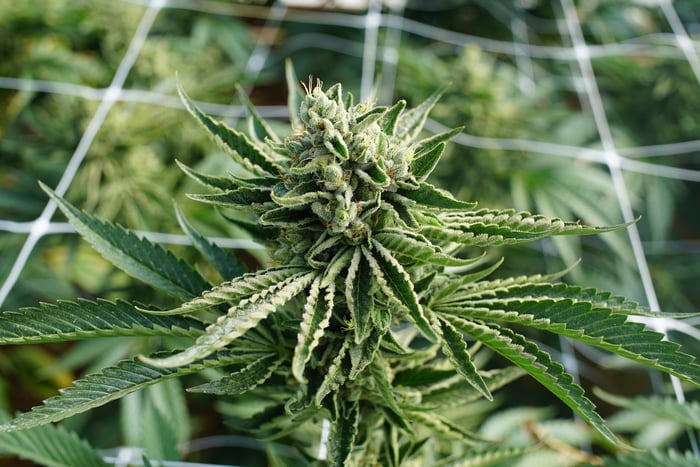There's been no industry hotter to start the new year than marijuana. Now a legitimate business model following the legalization of adult-use cannabis in Canada this past October, the highly followed Horizons Marijuana Life Sciences ETF, which holds around four dozen pot stocks, is up 60% year to date through the end of February.
Of course, the basket approach has taken a back seat to a number of top-performing individual pot stocks, such as Aurora Cannabis (NYSE:ACB). Since uplisting from the over-the-counter exchange to the New York Stock Exchange in October, Aurora Cannabis has gained quite the following of optimists. Recently, it surpassed Apple to become the most widely held stock on free online trading app Robinhood, which is extremely popular with millennial investors.
Curious what it is about Aurora Cannabis that makes it such a popular stock to own? Well, it boils down to three things that the company simply does better than its weed-growing peers.

Image source: Getty Images.
1. It can out-produce any other companyEasily the biggest differentiating factor between Aurora Cannabis and every other pot company is its production capacity. According to more recent press releases from Aurora, management has been conservatively calling for "over 500,000 kilograms" in annual output, when running on all cylinders. But this is probably low-balling the company's capacity by a longshot.
Before its roughly $200 million purchase of South America's ICC Labs last year, and following its acquisition of Ontario-based MedReleaf, the company was touting peak production of roughly 570,000 kilos per year. Although ICC Labs doesn't bring a lot of immediate production to the mix, with 92,000 square feet of operational greenhouses, it had approximately 1.1 million square feet under construction at the time of the buyout. With most of Aurora's facilities averaging closer to 125 grams per square foot -- about 25% higher than the industry average -- this leads me to estimate up to 700,000 kilos in peak annual yield.
Just how much marijuana is this? Although production figures remain fluid with Health Canada continuing to work through its backlog to issue cultivation licenses and sales permits, it wouldn't be out of the question for Aurora to produce 15% to 20% of the total annual cannabis output from Canadian growers.
By comparison, the only remotely close competitor Aurora Cannabis has is Canopy Growth (NYSE:CGC), the largest pot stock by market cap. Canopy Growth has been tight-lipped with peak production estimates, but does have 5.6 million square feet of growing capacity, more than 4.3 million square feet of which is already licensed. Assuming industry average yields, Canopy Growth could see anywhere from 500,000 kilos to 550,000 kilos of annual peak yield. After that, it's a big drop-off to the No. 3 and No. 4 growers, Aphria and The Green Organic Dutchman, with 255,000 kilos and 195,000 kilos in respective projected annual production.
Having such impressive annual output should help Aurora nab long-term supply deals and make it a logical target for brand-name beverage, food, tobacco, or pharmaceutical industry companies looking for a partner.

Image source: Getty Images.
2. Its international reach is unparalleledLast week, Aurora Cannabis announced that it had comes to terms with Gaia Pharm in Portugal to acquire a 51% interest in the company. This follows Gaia (soon to be renamed Aurora Portugal) receiving approval from the EU to construct a cannabis cultivation facility on Feb. 21, 2019. Although the facility will be relatively small in terms of peak output at 4,000 kilos a year, it nonetheless marks the 24th country that Aurora Cannabis has a growing or sales presence in.
When compared to its peers, no other top weed grower comes anywhere near Aurora in terms of its international reach. Canopy Growth has operations in just over a dozen countries, whereas Aphria is around a dozen, and Cronos Group has far fewer than a dozen markets overseas where it has growing or sales ties.
What's the big deal about international markets? If Colorado, Washington, and Oregon in the U.S. serve as examples, dried cannabis flower tends to be oversupplied and commoditized over time. As production ramps up throughout Canada, it wouldn't be surprising to see supply outpacing demand by as early as 2021. To sell domestic excess supply, Canadian growers like Aurora will be looking to medically legal, but still nascent, overseas markets. With a presence in two dozen countries, Aurora has substantially reduced the likelihood that domestic oversupply will hurt its margins. The same can't be said for Cronos Group and a number of other producers.

Image source: Getty Images.
3. It generates more in ancillary revenue than other pure-play growersA third and final thing that Aurora does better than other growers is generate revenue from ancillary sources.
Now, I know what you're probably thinking, and you'd be right: there are other marijuana stocks that generate a boatload of ancillary revenue. An example would be Village Farms International, which has generated $111.2 million in sales from vegetable production through the first nine months of fiscal 2018. But Village Farms International, and these other pot stocks in question, aren't pure-play growers like Aurora Cannabis. If we want to stick to apples-to-apples comparisons, Aurora Cannabis generates more icing on the cake than its peers.
In Aurora's second-quarter operating results, it recorded nearly 47.6 million Canadian dollars in net cannabis revenue, with an additional CA$6.6 million derived from its ancillary businesses. These include Larssen, an engineering and construction firm for greenhouses that was acquired by Aurora in November 2017, patient counseling services, analytical testing services, and its horizontally integrated businesses. Net of excise tax revenue, ancillary sales accounted for 12.2% of sales in the fiscal second quarter.
Although these secondary revenue channels will minimize over time (in terms of total sales percentage) as medical and recreational pot sales soar, they're providing more of a boost to Aurora than any other pot grower.
No comments:
Post a Comment